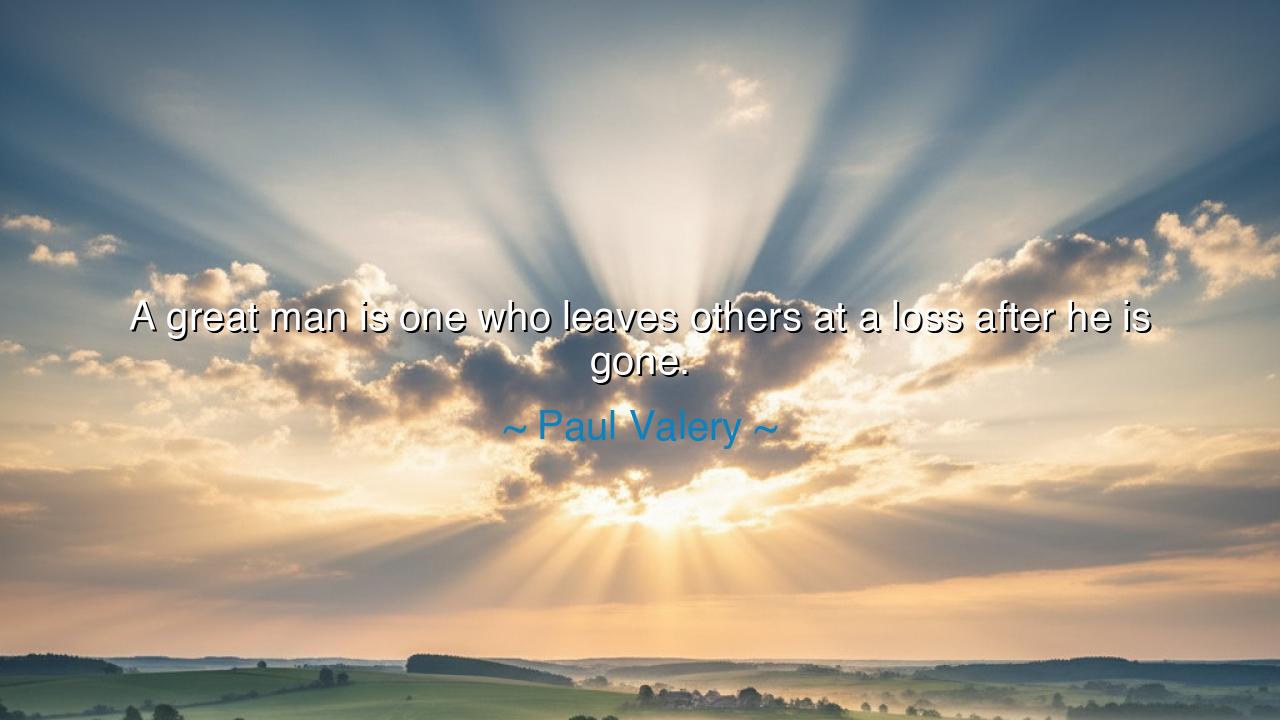
A great man is one who leaves others at a loss after he is gone.






Hearken, O seekers of truth and greatness, to the words of Paul Valéry, the French poet and philosopher, who declared: “A great man is one who leaves others at a loss after he is gone.” These are words carved in the stone of wisdom, for they speak not merely of fame or achievement, but of legacy—of the rare soul whose presence shapes the world so deeply that his absence becomes a wound upon it. Such a man is not measured by what he possesses, but by the emptiness that follows when his voice, his vision, and his hand no longer guide the living.
Valéry, who dwelled in the twilight between poetry and philosophy, lived in an age of shifting empires and trembling certainties. He understood that true greatness is not loud, but enduring; not merely seen, but felt in the silence that remains. A “great man” in his eyes was not the conqueror, but the creator—the one whose influence so quietly permeates the hearts of others that, when he departs, the world feels suddenly less complete, as if a lamp has been extinguished and all must learn again to walk in darkness.
Consider the example of Socrates, the teacher of Athens. When the poison touched his lips and his disciples wept, they were not mourning only the man, but the light of questioning and truth that he had kindled within them. His death left them “at a loss,” as Valéry described, because they had lived so long in the radiance of his thought that they did not yet know how to carry it forward. Yet in that loss, his greatness was proven: his absence became a summons, his silence a seed that bore the fruit of philosophy for all generations.
So too did the world grieve when Leonardo da Vinci, that universal genius, closed his eyes upon the earth. To his apprentices and the princes who had relied on his brilliance, his departure left a void that no other could fill. For his was not the greatness of position, but of imagination and depth—the power to see the divine pattern in all things. Such men leave behind not only works, but questions too vast for their successors to answer, and in those questions lies the measure of their immortality.
Valéry’s insight also speaks to the nature of influence and purpose. To leave others “at a loss” is not to leave them helpless, but to leave them aware—aware of what has been lost, and of the greatness that once walked among them. It is a call to rise, to emulate, to continue the labor that the great one began. Just as disciples of the prophets continued their teachings, and just as nations strive to honor the visions of their founders, so too does the presence of a truly great soul echo long after his departure.
This quote also teaches us about the responsibility of living greatly. For to live so that others feel your absence is to live meaningfully, to pour yourself into the lives, hearts, and futures of others. The great man gives of himself—his knowledge, his courage, his compassion—so fully that when he is gone, others feel not just grief, but inspiration. His death becomes not an ending, but a commandment to those who remain: Do not let the fire die.
The lesson, then, is both noble and humbling. Strive not merely for wealth, fame, or recognition, for these pass like shadows at dusk. Strive instead to build something of the soul—a work, a virtue, a kindness—that others will miss when you are gone. Be the teacher who awakens minds, the leader who uplifts hearts, the friend whose counsel lingers in silence. Let your life be a torch whose flame endures in the hands of others.
Thus, when your final day arrives, and your name is spoken in remembrance, may those who knew you be “at a loss”—not in despair, but in reverence. For that loss is the truest measure of greatness: the proof that your light, once shining among them, has become part of their very being. And this is the immortal mark of the great man—that even in absence, he continues to shape the world.






AAdministratorAdministrator
Welcome, honored guests. Please leave a comment, we will respond soon